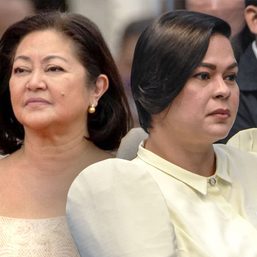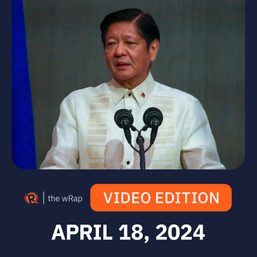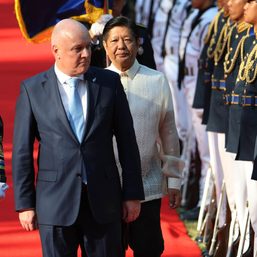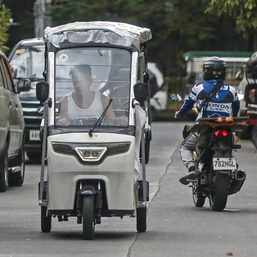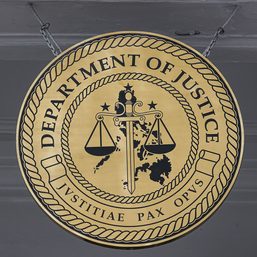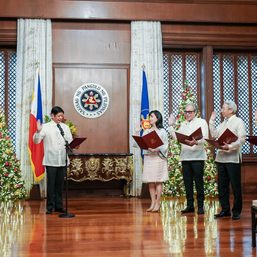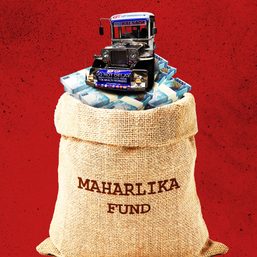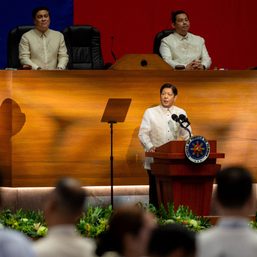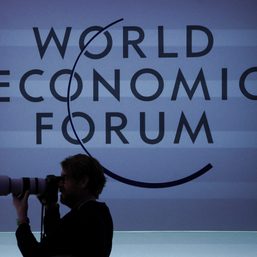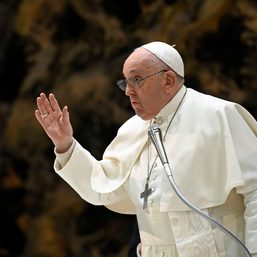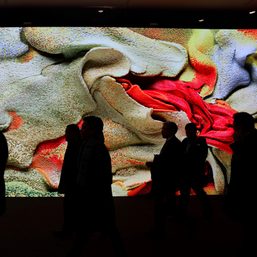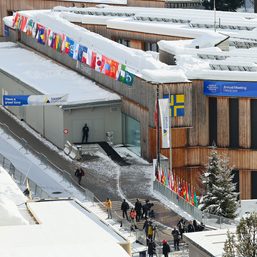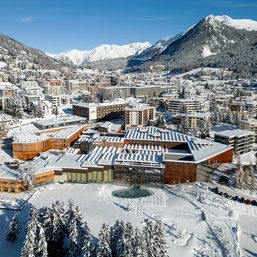SUMMARY
This is AI generated summarization, which may have errors. For context, always refer to the full article.
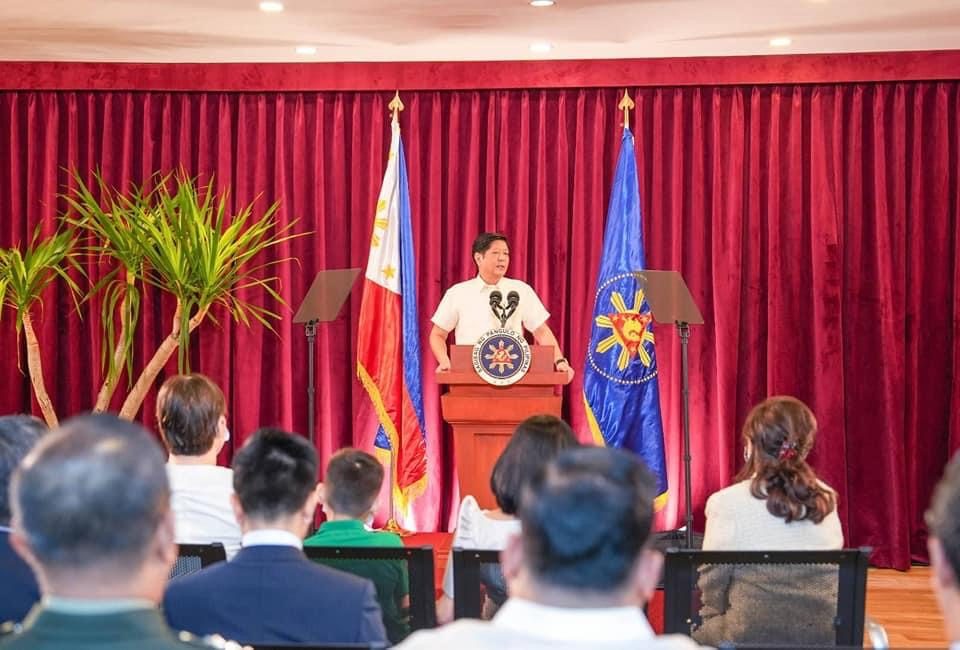
MANILA, Philippines – In President Ferdinand Marcos Jr.’s own words, his January 2023 visit to Davos in Switzerland for the World Economic Forum (WEF) won’t be too different from his previous trips abroad. This time though, he intends to sell to foreign investors and fellow world leaders the controversial sovereign wealth fund his administration is pushing.
“In general, pare-pareho naman ‘yung ginagawa natin dito sa mga trips (what we do in these trips are the same). We talk about the Philippines, what the situation is as an investment destination. Now, as added to that, mayroon na tayong pwedeng pag-usapan na (we can now talk about the) sovereign wealth fund,” he told the media on board the presidential plane on the way to Zurich from Manila on Sunday, January 15.
Marcos has been to eight countries, thus far, in his first seven months of office. In early September, for his first state visits as chief executive, Marcos flew to Indonesia and Singapore.
Later that month, he spoke for the first time before the United Nations during its first in-person General Assembly. In November, he flew to Phnom Penh and then Bangkok for two high-level meets – the Association of Southeast Asian Nations (ASEAN) Summit and the Asia-Pacific Economic Cooperation (APEC) Summit.
In December, Marcos flew out for one last time to Brussels for the ASEAN-European Union Summit. In early January, he was in Beijing for a little over 48 hours for his first state visit outside of Southeast Asia.
As he hops around the world, his mission – according to the President himself, the administration’s communications arm, and the Department of Foreign Affairs (DFA) – is the same: to sell the Philippines as ready and ripe for investments.
But are we?
Rappler columnist and economist JC Punongbayan says that while Marcos and his economic team are right – that the Philippines and our neighbors in East Asia are likely to buck the global recession – growth isn’t looking to be any better, either.
Marcos flies to Davos as Philippine inflation hits a 14-year high, driven mostly by the rising cost of goods. The President has said the problem is our dependence on imports and that improving local production is important in solving the rise in food prices. Marcos is concurrently agriculture chief, meaning keeping production in check and food prices down is primarily his job, too.
According to a survey by the WEF ahead of the meeting, the following are top concerns of Davos attendees: the threat of recession, the cost-of-living crisis, mounting debt distress, and the failure to tackle climate change.
What the WEF?
This year, the WEF wants to talk about ”cooperation in a fragmented world” – a befitting theme, given one issue that hangs over all attendee’s heads: Russia’s war on Ukraine.
Ukrainian first lady Olena Zelenska is among the first and most prominent speakers on the first day of the gathering.
The WEF – often referred to simply as “Davos” – is an annual gathering of business and political elite in the idyllic town of Davos in Switzerland. In 2021, the WEF was cancelled because of COVID-19 while in 2022, it was scaled-down and held in the middle of year, months after its usual winter schedule.
Its goals – at least on paper – are ambitious. On its website, the WEF says its goal is “solving the biggest issues facing our world.”
Filipino magnate Enrique Razon, chairman and CEO of the International Container Terminal Services (ICTS) once vented about the forum in a 2014 interview with Bloomberg. “It’s loaded with bloated self-importance… I’m here to do business, not save the world,” he said then.
Razon is among the Filipino businessmen who are in Davos again for the 2023 edition.
What happens, exactly?
According to Reuters, WEF isn’t too far off from every other international meet. Delegates, particularly those with white badges which get greater access, listen in on panels and speeches inside the Congress Center.
On the sidelines, business executives hold meetings and heads of state organize bilateral meetings, which Reuters notes takes up most of their time. Marcos, however, is not expected to hold bilateral meetings on Davos, at least according to the DFA in its briefing ahead of the President’s trip.
Sure, he’s expected to mingle and meet fellow world leaders there, but these will likely be casual exchanges sans the procedure of an actual bilater,al meeting. Previous trips, save for the state visits, always included bilateral meetings in the schedule.
At the Davos main promenade, shops and restaurants are rented out by companies and countries. This is where they host parties and discussions on the sidelines of the main WEF events, according to Reuters.
The Philippine delegation
Marcos brings with him a team of 16 official delegates, as well as his wife, First Lady Liza Araneta-Marcos. His delegation, as published in the manual for Philippine media in Davos include:
- Former president and House Deputy Speaker Gloria Macapagal-Arroyo
- House Speaker Martin Romualdez
- Finance Secretary Benjamin Diokno
- Trade Secretary Alfredo Pascual
- Transportation Secretary Jaime Bautista
- National Economic Development Authority Chief Arsenio Balisacan
- Migrant Workers Secretary Susan Ople
- Communications Secretary Cheloy Garafil
- Special Assistant to the President Antonio Lagdameo Jr.
- Presidential Adviser on Foreign Affairs and Chief of Presidential Protocol Adeline Angelito Cruz
- Senator Mark Villar
- House Senior Deputy Majority Leader Sandro Marcos III
- House Accounts Chairperson Yedda Romualdez
- DFA Undersecretary Carlos Sorreta
- Finance Undersecretary Zeno Ronald Abenoja
- Migrant Workers Undersecretary Patricia Caunan
Of the 17 in his delegation, 9 are part of the WEF’s list of “public figures” participating in the event. Information and Communications Secretary Ivan John Uy and Foreign Affairs Secretary Enrique Manalo are in the WEF’s list but are not in the official delegation list.
Like his previous trips abroad, Marcos is traveling with several family members who are also ranking officials in Philippine government. Speaker Romualdez is his cousin and Representative Marcos is his son. Accounts Chairperson Romualdez is the wife of the Speaker.
The Presidential Communications Office (PCO), tasked with the government’s communication and messaging, has not released an official delegation list for Davos.
The PCO, which was originally named the Office of the Press Secretary at the start of the Marcos admin, has never released the official delegation list of Marcos’ travels, despite repeated requests from media.
Marcos’ plans
The Philippines is expected to host on Tuesday, January 17 a “country strategy dialogue,” or an event where economic managers – who make up the bulk of the official delegation – will talk about their plans for the country. They’ve hosted the same sort or event on the sidelines of Marcos’ other trips.
Marcos said the Philippines will touch on its plans to develop “resilient infrastructure” to reinforce supply chains and improve food security, as well as its COVID-19 plans. The President is keynote speaker for the event.
The bulk of Marcos’ schedule includes meetings with fellow participants, particularly from the business sector.
On January 18, Marcos will be part of a panel on “Moving Toward Nutrition Security.” The same day, he will be speaking at a dialogue on “investing in infrastructure for resilience.”
As his preliminary schedule suggests, the WEF is mostly talk.
In Davos, Marcos is angling to talk much about his pet sovereign wealth fund. “Sasabihin ko (I’ll talk about) exactly what’s happened that we are forming a sovereign wealth fund for investments in the… for big investments in the basic areas such as agri, energy, digitalization, climate change, ‘yun ganon pa rin. But the point being is that now there is a social – there is a wealth,” he told media.
But in a gathering that will focus on the threat of recession, the rising cost of goods, and conflict like the war in Ukraine that affects supply chains and the world’s economic stability, will enough ears be listening? – Rappler.com
How does this make you feel?

